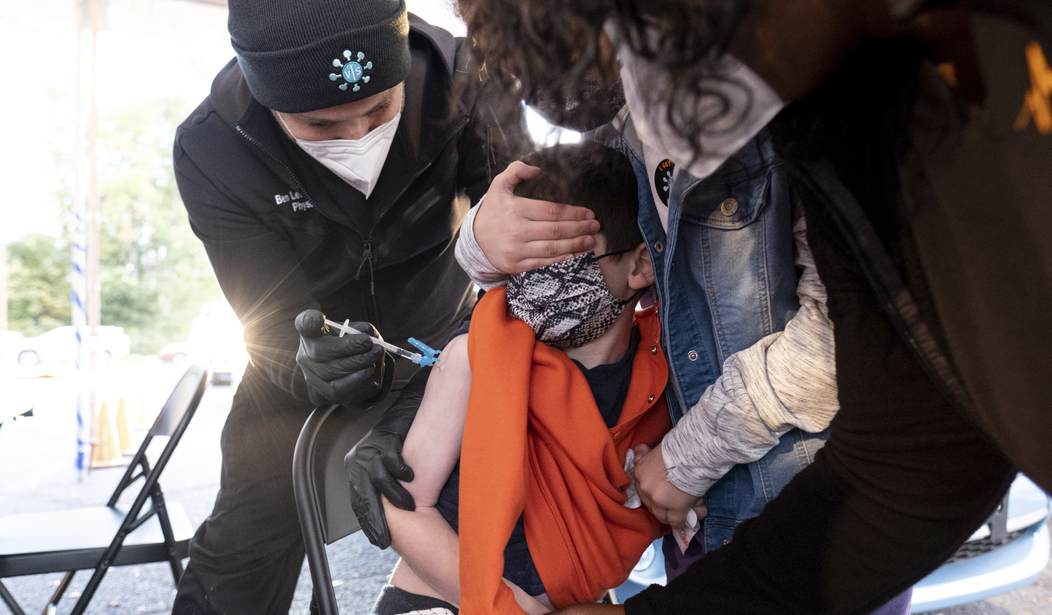This seems like a finding the feds should want to tout, to nudge parents who are still holding out on getting their third doses. (And there are a lot of those parents out there.) Moms and dads will do anything for their kids. What if they could meaningfully reduce their children’s chances of catching COVID without forcing those children to get vaccinated themselves?
New data from Israel suggests there’s something to that idea. Or there was something, anyway: This study focused on transmission during periods when Alpha and Delta were prevalent. It’s anyone’s guess how well protected a child would be from an immune-evasive variant like Omicron if both parents are boosted.
A similar study was conducted in Israel early last year, after the vaccines first began rolling out, to gauge whether kids in more heavily vaccinated communities were less likely to catch COVID than kids in less heavily vaccinated ones. The unsurprising answer: Yes. “For every 20 percentage point increase in the share of 16- to 50-year-olds who were vaccinated in a community, the researchers found, the share of unvaccinated under 16s who tested positive for the virus fell by half,” the NYT reported. Vaccinated people are less likely to get infected and therefore less likely to infect others, so go figure that kids will have less exposure to the virus if they’re surrounded by vaccinated adults.
The new study out today applied the same theory to families instead of communities. Do kids who live in homes where both parents have had three doses catch COVID less often than kids whose parents aren’t boosted? The answer: Again, yes. At least when we’re talking about Alpha and Delta.
“This study shows that vaccinating parents very much protects children who aren’t yet eligible for vaccines,” Dr. Noam Barda, one of the study’s authors, told The Times of Israel. “Actually, it shows that it’s probably the best thing we can do for kids, and the study is a call for parents who aren’t vaccinated or aren’t up to date with boosters to take action to protect their loved ones.”
Another author of the study, and a researcher at Harvard Medical School, Dr. Ben Reis, said: “Parents have a sacred duty to protect their children from harm. Especially in families where children are too young to be vaccinated, this study provides stark evidence of the importance of parents being vaccinated – protecting not only themselves, but their children as well.”…
After studying around 77,000 households, the researchers found that when one parent in a family had a booster shot, it lowered the risk of children being infected by 21%, compared to households where parents had just two shots. In families where two parents had boosters, the kids had a 58% lower infection risk than in families with double-vaccinated parents.
Those are the numbers against Delta. Protection was higher against Alpha, but as far as I know Alpha is now all but extinct. Note the force multiplier involved in both parents being boosted, though, from a mere 21 percent advantage against infection for children to a 58 percent advantage. That’s a demonstration in microcosm of why vaccination isn’t just a “personal choice.” The more highly vaxxed a community is, the more difficulty the virus will have jumping from host to host, even inside a family home.
Or such was the case before Omicron. In the Omicron era, even the most highly vaccinated country in the western world, Portugal, is seeing infections skyrocket:

Five days ago they recorded 65,000 cases in a day, around five times the previous peak pre-Omicron. But there’s a payoff to their high vaccination rate:

They’re seeing around 30-40 daily deaths lately. Last winter, at their peak, they saw 300. Vaccination is no longer a strong defense to transmission but it’s getting the job done where it counts.
There’s another study out today with implications on how to keep kids (and adults) safe. Take some of the doses we’re reserving for children, who seldom have trouble with COVID under any circumstances, and divert them to vaccinating immunocompromised people in poorer countries. Because those people can unwittingly become laboratories for the virus to mutate into fitter variants:
A South African woman suffering from inadequately treated HIV, and who harbored Covid-19 for nine months saw the respiratory virus develop at least 21 mutations while in her body, according to a study.
Once the 22-year-old adhered to the anti-retroviral medication used to treat HIV and her immune system strengthened she was able overcome the Covid-19 infection within six to nine weeks, the study, led by scientists from Stellenbosch and the University the University of KwaZulu-Natal showed. The research has not been peer reviewed.
The study adds to evidence that Covid-19 may mutate rapidly when harbored by immunosuppressed individuals, such as those not taking medication to treat HIV, and this may lead to the development of new variants. The beta variant, which the patient in the study was infected with, was discovered in South Africa, as was omicron.
That’s been the leading theory of how Omicron, a strain with a freakish number of unusual mutations, developed since day one. Scientists believe an immunocompromised person caught COVID and couldn’t clear the virus quickly the way a healthy person would. So it lingered in their system for weeks or months, mutating randomly all the while without being quashed, until it had turned into Omicron and then by chance made the jump to another person. If we can’t get vaccines (and other antivirals, especially HIV therapies) to the third world, they could become factories for future strains. If Biden’s looking to launch an Operation Warp Speed 2.0, that would be a solid candidate. Stop the new variants and let the immunity that so much of the world has already acquired do the rest by ending the pandemic.









Join the conversation as a VIP Member